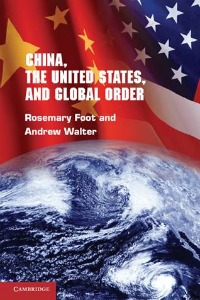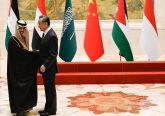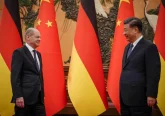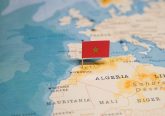Rosemary Foot is a Professor of International Relations and John Swire Senior Research Fellow at St Antony’s College, Oxford. She has been a celebrated China scholar since completing her doctorate at the London School of Economics on Sino-Soviet relations and West Asia. Here, Professor Foot takes a moment to speak with Politics in Spires regarding her most recent book.

Congratulations, your latest book, China, the United States, and Global Order has been praised by Foreign Policy Magazine as one of the 23 Essential Readings of 2011. Could we begin with you telling us a bit about the efforts behind this work? The book was a collaborative effort.* My co-author [Andrew Walter] is a specialist in international political economy, and I work on international security issues. It seemed to us that it would be valuable to collaborate across these two general issue areas because so often they’re treated in separate texts. We wanted to be able to cover a wide range of global issues in this book. A lot of the writing in IPE [international political economy] tends to see relationships in competitive but positive-sum terms, but in the sub-field of security the emphasis is on rivalry and zero-sum outcomes. We wanted to test that proposition. We also wanted to test whether the description of states as either “revisionist” or “status-quo”, or as “norm-makers” or “norm-takers” was helpful in understanding major differences between US and Chinese behaviour. We wanted to examine US and Chinese behaviour with respect to key global norms both comparatively and also to assess how their bilateral relationship was influencing their respective positioning in respect of global norms. The idea for the book came initially from the publishers, who contacted us looking for something slightly different—a book that was more China-focused, actually. At the time, however, there were large numbers of books coming out on China, and so we decided not to add to that per se, but instead to think comparatively about the two most important states in the global system. *Foot wrote the chapters on the non-proliferation of nuclear weapons and use of force, and co-wrote the chapter on climate protection. She and Andrew Walter spent about 3 years producing the book.
How do you feel relations between the two superpowers (China and the US) have been affected by the global financial crisis? First, as a preliminary to your question, I would not call China a superpower. Although China is a powerful state, it does not have all of the capabilities that one would associate with the term “superpower.” Yes, it is the second-largest economy in the world, but it is still a considerable way behind the US. On a GDP per capita basis, for example, Chinese GDP is about $4,500 per annum, about a tenth of the US level. If you compare the size of their respective military budgets, in 2009 the United States spent 43% of the world total of military spending and China about 7%. The Chinese do not have the military global reach that we have come to associate with being a superpower. Nevertheless, both states are significant economic and political actors in the global system. China is one of the P5 on the United Nations Security Council, and it is a very major player, particularly within its own region. So, I would start out by saying that there is a power differential between the two countries, even though I would argue that they are the two most important states in the system. In terms of their more recent relationship, there has been a shift in relative power post-2008. The Chinese economy has continued to grow at a significant rate during this period of global financial turbulence. The Chinese leaders have taken a series of decisions that has served to keep growth rates high, at least in the short and medium term. There has also been the perception, particularly in 2010, that the Chinese have become more assertive in foreign policy terms, certainly within their own region, and this has led to higher degrees of tension with the United States. Some attribute this greater assertiveness to China’s enhanced confidence post-2008 –the shift in relative power vis-à-vis the United States and the West more broadly has emboldened the government. Others see this higher degree of assertiveness as stemming from the greater degree of pluralism within Chinese society. Individuals and interest groups are more vocal than in the recent past and these actors are demanding that the Chinese government represent their concerns in their dealings abroad. Chinese citizens, companies, etc. now go abroad in large numbers. For example, in the recent Libyan crisis, the Chinese government had to repatriate 30,000 workers, and they did this quite effectively. The Chinese government doesn’t have any foreign bases from which they can operate aircraft, so they relied to some extent on commercial airfields. Chinese citizens are demanding more of their government, and that means that the government itself feels it has got to respond. It’s an authoritarian government, but nevertheless, it is not totally divorced from interest groups and mass public opinion. Finally, there is also the argument that the military has grown more powerful under a leadership that is less authoritative than was the case with Deng Xiao Ping and Mao Zedong; the collective leadership that we have seen in China since the late 1990s has less authority and less ability to centralize the message coming out of China. Since 2010, the government leadership has been working to regain a bit more control over these many voices and is trying to recapture an earlier theme of Chinese foreign policy: that China is rising but is a different kind of rising power. China of the late 20th Century-early 21st Century is not the same as Japan or Germany in the 1930s; instead China is and will be a peaceful rising power, and the assertive behaviour of the earlier period was not reflective of a more aggressive foreign policy. So, the relationship between the US and China has to be navigated in this new, post-2008 environment. On the American side, we’ve seen a shift in military strategy to some degree, an emphasis on shifting attention away from its involvements in Afghanistan and Iraq and pivoting towards Asia. There has been a strengthening of relationships between the United States and South Korea, Japan, the Philippines, Vietnam, India, and Indonesia. To some degree, this is related to the rise of China, [and] to the assumption that the rise of China could pose a challenge to American preponderance in the Asia-Pacific region, but I do not think it is the only reason for the change in American policy. There are other reasons why the United States has shifted its attention to Asia: it has longstanding commercial interests in the region and these are magnified by the strong growth rates in large parts of the region. The US has real concerns over North Korea and its nuclear programme, over the instabilities inherent in the relationship between China and Japan, and a concern about the capacity of Southeast Asia to sustain cooperative mechanisms in terms of their own relationships. There is a sense in Washington that it is a vitally important region, strategically and economically, and it makes sense for the United States to be there.
In recent years there has been discussion of a ‘waxing’ China and a ‘waning’ United States in terms of global power. Is this an oversimplification? What has fuelled this notion? I think two things have fuelled it. One is obviously the global financial crisis and US indebtedness. I think added to that is the incapacity of the American domestic political system to address these problems: the inability to use the tax system to address budgetary concerns; to spend money on new infrastructure; and the stasis that results from the presidential electoral season. However, I do think this notion of a waning United States is exaggerated because it is clearly a resilient society. America still has a huge, and varied economy, capable of great innovation, and still has, at the top level, a very good education system; in military terms, it is obviously far in advance of any other state in the global system. So, I think there is relative decline, but discussion of this sometimes is exaggerated. That decline is neither steep, nor necessarily linear. Similarly, with China, there have been impressive growth rates over the past three decades, with millions of people being brought out of poverty, and a leadership that is actually pretty smart. The transition to the next set of leaders will take place in 2012 and, in my view, this transition will go relatively smoothly. But the Chinese leadership faces huge problems as well. I am sure that when these leaders wake up each morning, they are not thinking about foreign policy, but about domestic social unrest, the lack of provision of a proper welfare system, about how to deal with the issue of internal migrants (some 200 million people on the move from villages to urban areas demanding the same rights as urban locals), and so on. These very big and costly problems are what absorb a great deal of attention of the Chinese leadership: social unrest, ethnic unrest, are clearly prominent parts of the decision-making agenda. Finding a successful way to respond to these issues is challenging, especially in the context of one-party rule and an unwillingness to share political power. The leaders realize they need, at a minimum, some form of deliberative participation; even if they won’t allow a proper electoral democracy and multi-party system (indeed they will do all they can to avoid it), they realize they have to be responsive. As I said earlier, the society expects more of the government: citizens expect them to deal with the pollution in the cities, they expect them to put in place a better and proper health service, they expect pensions, [and] they expect their children to have reasonable schools to go to. Given these expectations, the current leadership realizes its time is limited unless it can respond to these costly demands. The leadership also realizes it needs to move away from its export-led system towards the development of a more diverse internal market: to share the benefits of its economic success more widely. These types of transitions are very difficult to effect, and the next few years could be very bumpy indeed.
How (if at all) have relations between China and the US varied between the Bush and Obama administrations? Many of the Bush policies have actually been continued. These policies may be renamed, but the bilateral dialogues (for example, the strategic and economic dialogues), were begun in the Bush period and are being continued under Obama. Obama started, I think, with an intention to try to convince the Chinese that he was going to treat them as equals, that there was mutuality in the relationship that needed to be fostered, and that he was going to downplay the competitive elements in the relationship. I think he has moved somewhat away from that, which increases the similarity between the second Bush administration and the Obama administration. Both these administrations recognized that there are cooperative elements in this relationship— they are economically interdependent, they have coincident interests in various foreign policy areas such as in counterterrorism, keeping stability on the Korean peninsula, trying to keep stability in China-Taiwan relations. But there is also a competitive element as well and this has emerged more strongly in the last few months. I think that rivalry is particularly manifest in the Asia-Pacific region as I said earlier. The US has long enjoyed a preponderance of power in the region, and so making way for China and its interests has been difficult. Similarly, the perception in some quarters is that the Chinese represent a kind of state-capitalist development model that has been rather successful. There is a sense in which the two economic systems [free market capitalism versus state-driven capitalism] are ideological opponents; there is discussion of whether the authoritarian economic model is better able than the United States’ to deliver positive outcomes. Again, that is an exaggerated description of both sides’ economic models, but it is a debate that is certainly being written about and considered by other governments as they think about modes of development. Moreover, while this is not a debate that was prominent during the Bush era, it is prominent now during the Obama period.
In reference to 2010’s controversial Nobel Peace Prize recipient, Liu Xiaobo, can you speak about China’s human rights record? This is a very complicated question, because if you go back to the Tiananmen bloodshed of 1989, I would say that China has come quite a way from the position that “whatever goes on inside a state is nobody’s affair but its own.” China would no longer argue that. It also participates at a rhetorical level and legally in the international human rights regime: it has signed the two core covenants, it has signed the Convention Against Torture, and it participates at an international level in bodies such as the Human Rights Council. It has various human rights centres in universities and think tanks. As a result of its economic policy, it has brought millions of people out of poverty, and I would regard the right to subsistence as an important part of the human rights agenda. It is also the case that people are now much freer to take decisions about their everyday lives compared with the Maoist period, [such as] where they work, about where their children go to school, and so on. Among academics, at conferences in Oxford and other academic venues, they are more willing to speak freely and to voice criticisms of their government and its policies. They have a much greater space in which to express their views. However, if the leadership perceives that an oppositional figure outside the Communist Party might be emerging, or there is a social movement that seems to threaten the one-party system, or evidence of ethnic unrest, then the security apparatus will move against that person or group. They were particularly tough on Liu Xiaobo. He has a long history of activism on human rights questions. He was arrested in 1989 at Tiananmen, and has spent a large part of his young life inside prison. This last arrest came about because he was an author, among others, of Charter 08, a publication which marked the 60th anniversary of the UN Declaration of Human Rights and which was inspired by Charter 77. Charter 08 argued that China would never be a truly civilized, modern, nation, until it protects human rights and promotes democracy. In other words, the document was advocating a direct change in the political system and because of this the authorities moved against Liu Xiaobo. So, he will spend a very long time inside prison. It is when somebody emerges with this leadership capacity and authority that the Chinese security apparatus tends to say “enough is enough.” While there has been a general improvement in political and economic freedoms compared with Mao’s period, it is still the case that if you demonstrate leadership qualities outside the confines of the Party, you are likely to run afoul of the authorities and they will treat you harshly.
Many thanks for speaking with Politics in Spires about your relevant and fascinating research. What can we anticipate from you next? Partly as a result of this book, I have been asked to do a lot of writing on global governance issues involving China. I am currently in the process of editing another book, China Across the Divide: Domestic Politics and Society & China’s Global Relations, which focuses on the intersection between international and local issues, such as growing Chinese consumerism and its affect on global markets, recent waves of immigration to China, and human rights. Finally, I am also co-editor of the forthcoming Oxford University Press handbook on the international relations of Asia.
China, the United States, and Global Order is available for purchase at Blackwell’s or Amazon.com.
Cailin Crockett is a second-year MPhil in Political Theory at Oxford University.








No Comment